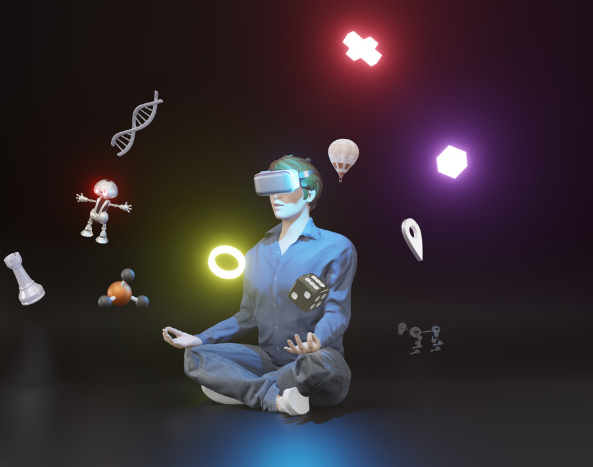Web3 (short for web 3.0) is the third conceptual iteration of the World Wide Web, interconnecting data in a decentralized manner in order to provide a faster, more personalized user experience. Web 3 is a combination of older-generation Web tools with cutting-edge technologies like artificial intelligence, machine learning, and blockchain.
Thanks to the usage of these disruptive technologies, Web 3 is going to redefine the way we interact with the digital world, transforming every aspect of our life, from the way businesses work to how we interact with one another.

In Web3, Information and content will be more connected and ubiquitous than ever before. In addition, websites and applications will make better use of data and adapt the information for every user.
Underpinned by blockchain technology and open-source technology, Web 3 is creating a more independent, decentralized, and autonomous web, where power is returned to the masses and dependence on centralized ecosystems is reduced to the minimum.

Blockchain, by allowing a trustless, permissionless experience, will decrease the control of large corporations like Google (Alphabet) or Meta (previously Facebook), making the internet more democratic. Browsing the internet will not need you to be signed into Facebook, Google, or Twitter. In Web3, users communicate via decentralized apps, or dApps, rather than through traditional channels and processes.
Web 3.0 will make the Internet more intelligent, secure, and transparent, enabling a more efficient surfing experience and an improved interaction between humans and machines. Information and content will be accessible across a multitude of applications, with a growing number of daily devices connected to the Web.
To benefit from Web3 Internet, companies are investing in building its foundations via technologies like:
In Web 2.0 users' data and behavior are analyzed and used to provide more personalized Web browsing experiences.
As the public grows increasingly tired of the breaches in privacy and data collection by large technology companies, Web 3 core premise of decentralization has never looked more appealing.
Securing decentralization, data privacy, and control of digital identities will provide critical benefits for Internet users. In web3, everyone will be able to participate in direct control over the Internet protocols, instead of using a free technology platform in exchange for their private data, which is what happens on social media such as Facebook and Instagram.
In this new setup, users can own their data and conduct transactions without permission and in a peer-to-peer fashion, circumventing the intermediaries needed by anyone with an internet connection and cryptocurrency wallets.
Cutting-edge technologies like crypto-currencies and non-fungible tokens (NFTs) will play a prominent role in Web 3 since they reflect the ownership sentiments within the decentralized blockchain networks.

Users will be able to trade money and information online, with no need for middlemen such as banks or technology companies. The Internet probably would look the same, at least at first, but the Web3 world, activities, and data would be hosted on a network of computers using the blockchain instead of on a company's servers. This will create a whole new online economy, giving companies multiple opportunities to make a profit online in previously unknown ways.
Web3 applications -- commonly called DApps (decentralized applications) or Blockchain applications -- run either on blockchains, decentralized networks of many peer-to-peer nodes (servers), or on a mix of blockchains forming a crypto-economic protocol. In Web3, developers do not create and deploy applications running on a single server, or store their data on a single database (usually hosted on and managed by a single cloud provider).
Applications and solutions built in the Web3 ecosystem are truly decentralized, with built-in features such as improved security, features, lack of censorship, and data integrity.
One such example is The Sapien Web3 app powered by SPN, an ERC 20-valued token. Sapien allows users to create their own decentralized apps using the Ethereum blockchain, with no payments required. It's the first tool delivered and used in a new blockchain-based platform, providing apps, services, and technologies.
The term web3 was coined by Gavin Wood in 2014 -- a co-founder of Ethereum cryptocurrency -- who believed centralization of the internet would be socially unsustainable over the long term.
Gavin Wood imagined a new economy built on top of the blockchain, in which individuals could offer services directly to one another, where no single entity is owned or controlled by the system, and in which the ability to exchange items of value existed intrinsically in each other's systems.
Web3 is used to access the metaverse, just as cars use roads. While Web 3.0 is focused on making the internet smarter and easier to access, the metaverse is a virtual environment one could exist and live within.
Web 3.0 is built upon blockchains and crypto-currencies, whereas the metaverse uses technologies like augmented and virtual reality. The aim of Web3 is to create a decentralized network using blockchain technologies only.
A blockchain-based Internet will enhance the current Internet in a number of ways. Web3 will take a variety of forms, including decentralized social networks, play-to-win video games that award players crypto tokens, and NFT platforms that enable individuals to buy and sell pieces of digital culture.
The main advantage of web3 lies in its decentralization, meaning instead of accessing the Internet via services that are mediated by companies such as Google, Apple, or Facebook, individuals own and control sections of the Internet themselves.